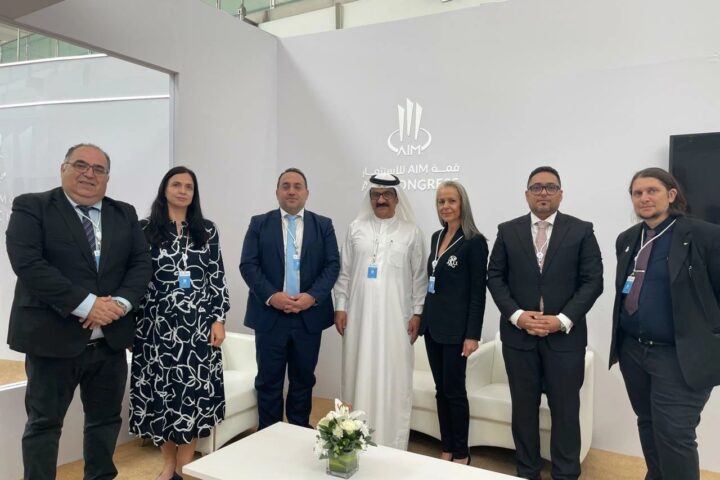By Gareth Jones
Turkish Cypriots are anxiously awaiting the outcome of an election this month in the Greek Cypriot government controlled areas that could cement partition of the Mediterranean island they share and wreck Turkey’s ties with Europe.
President Tassos Papadopoulos, who led Greek Cypriots into rejection of a U.N.-backed Cyprus reunification plan in 2004, is seeking re-election in the Feb. 17 poll but a strong challenge from two rivals is likely to force a second round on Feb. 24.
Victory for the hawkish Papadopoulos, who enjoys a small lead in opinion polls, would dash Turkish Cypriot hopes of a swift end to their international isolation and hobble Turkey’s efforts to revive its stalled European Union entry bid.
“The Greek Cypriot elections are very important for us… We don’t have much time, our peoples are becoming more estranged by the day,” Turkish Cypriot leader Mehmet Ali Talat told Reuters at his residence in Nicosia, Europe’s last divided capital.
Talat, whose community supported the 2004 U.N. peace plan, declined to comment on the candidates contesting the Greek Cypriot presidency, but said a fresh peace drive was essential.
“The status quo is not sustainable or fair because … we are isolated. This election is really the last chance (for change).”
Cyprus comprises an internationally recognised Greek Cypriot south — a wealthy EU member state which has adopted the euro and is home to 80 percent of the island’s one million people — and a poorer Turkish Cypriot north recognised only by Turkey.
It has been split on ethnic lines since Turkey invaded the north in 1974 after a Greek Cypriot coup backed by the military junta then ruling Greece. Turkey still keeps about 35,000 troops in the self-styled Turkish Republic of Northern Cyprus (TRNC).
Â
PERILS OF PARTITION
A Western diplomat based in Greek Nicosia said it was vital that all parties committed after the elections to a new U.N.-led peace process or face “a drift towards permanent partition”.
“We cannot allow this problem to fester … Cypriot voters perhaps don’t realise how stark the options are,” he said.
His warning echoed a recent study by the International Crisis Group (ICG), a respected Brussels-based think-tank.
“(An unmanaged slide to partition) would be profoundly damaging to Turkey’s convergence with Europe, Greek Cypriot prosperity, stability in the east Mediterranean and EU unity,” the ICG report said.
Leaving northern Cyprus in a legal and diplomatic limbo would undermine the fight against money laundering, human and drug trafficking and other international crime, it said.
The Cyprus dispute is already hampering closer cooperation between the EU and NATO in conflict zones from Kosovo to Afghanistan. Turkey is a NATO member but Cyprus is not.
This week, in a blow to EU unity, the Greek Cypriot government prevented the 27-nation bloc from forging a common position on Kosovo’s independence.
Cyprus fears Kosovo — whose independence is strongly opposed by Serbia of which the mainly ethnic Albanian province is still a part — would create a precedent for recognition of the TRNC, despite EU assurances that Kosovo is a unique case.
Brushing aside suggestions Kosovo might be a model for the TRNC, Talat said Turkish Cypriots still favour reunification along the lines of past U.N. peace plans, involving a loose federal government and wide autonomy for the two communities.
“Realistically, we can solve this problem in less than one year. There is already a huge body of work on what needs to be done … It is possible with good will and good faith,” he said.
With a settlement, Turkish Cypriots would finally enjoy the full benefits of EU membership while Greek Cypriots would regain land and property in the north and win access to nearby Turkey’s booming economy and its market of 70-odd million consumers.
Â
BARRIERS
But seasoned Cyprus observers are not optimistic. They say inter-communal contacts have fallen since the Greek Cypriots rejected the 2004 peace plan. Trade is static. Cooperation on issues ranging from crime-fighting to conservation founders on the Greek refusal to accept the legitimacy of the Turkish side.
“The two sides have become more entrenched. There are big psychological barriers,” said Hasan Kutlu Ince, head of the Turkish Cypriot Chamber of Commerce.
The Greek Cypriots’ blocking of EU efforts to end a trade embargo against the TRNC has eroded Turkish Cypriot support for the EU. Greek Cypriots fear allowing the TRNC to trade freely with the EU could lead to de facto recognition of the enclave.
Some say the TRNC’s isolation is already starting to crack.
Last week, to Greek Cypriot fury, former German chancellor Gerhard Schroeder led a delegation of German businessmen to northern Cyprus. Talat has held talks — unthinkable a few years ago — with EU foreign ministers and U.S. secretaries of state.
Several foreign companies including Australian franchise Gloria Jean’s Coffees now operate in northern Cyprus. Syria has opened a regular ferry link to the TRNC.
“I do not see how the two communities, with all the hang-ups they have about their relationship, can ever agree to come back together in one state to run their affairs,” said Ayla Gurel, an analyst at the International Peace Research Institute Oslo.
“(Another Papadopoulos win) might lead the international community to think the previously unthinkable — partition.” (Reuters)
Â







